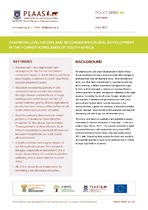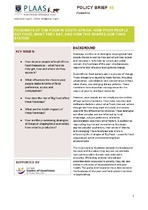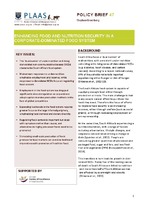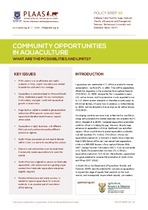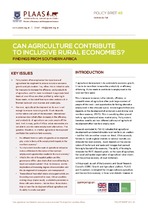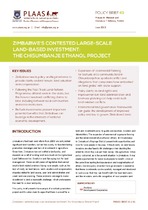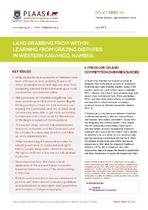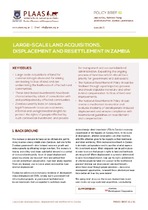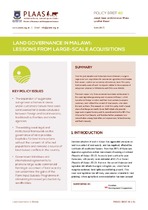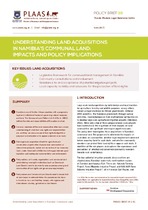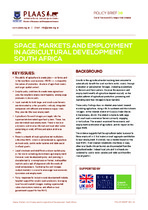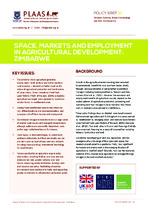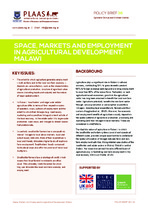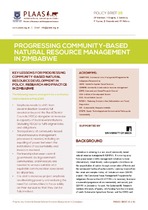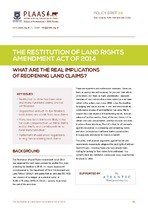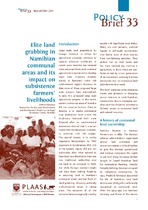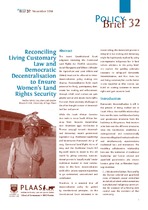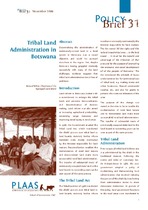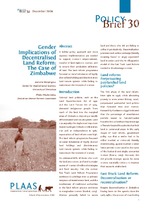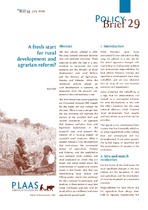Faculty of Economic and Management Sciences: Recent submissions
Now showing items 781-800 of 1101
-
Examining livelihoods and reconsidering rural development in the former homelands of South Africa
(Institute for Poverty, Land and Agrarian Studies, University of the Western Cape, 2017)Persistent poverty and under-development in South Africa’s former homeland communal areas have been little changed by post-apartheid ‘rural development’ policy. Rural development policy has often been characterised by ... -
Foodways of the poor in South Africa: How poor people get food, what they eat, and how this shapes our food system
(Institute for Poverty, Land and Agrarian Studies, University of the Western Cape, 2017)Foodways are the set of strategies shaping what food people choose as well as how and where they access and consume it. Informed by culture and social context, the foodways of the poor simultaneously respond to and ... -
Enhancing food and nutrition security in a corporate-dominated food system
(Institute for Poverty, Land and Agrarian Studies, University of the Western Cape, 2017)South Africa faces a ‘dual burden’ of malnutrition, with persistent under-nutrition coinciding with rising rates of diet-related NCDs (e.g. diabetes, heart disease, and certain cancers). According to a recent national ... -
Community opportunities in aquaculture, What are the possibilities and limits?
(Institute for Poverty, Land and Agrarian Studies, University of the Western Cape, 2016)Aquaculture now contributes 47% of fish available for human consumption – up from 9% in 1980. This shift to aquaculture offsets the stagnation in the production from capture fisheries (FAO 2012). By 2030, demand for ... -
Can agriculture contribute to inclusive rural economies?
(Institute for Poverty, Land and Agrarian Studies, University of the Western Cape, 2015)If agricultural development is to contribute to economic growth, it has to do more than increase the productivity or efficiency of farming. It also needs to contribute to employment in the rural non-farm sector. This ... -
Zimbabwe’s contested large-scale land-based investment: The chisumbanje ethanol project
(Institute for Poverty, Land and Agrarian Studies, University of the Western Cape, 2015)Zimbabwe’s fast-track land reform from 2000 onward yielded significant land transfers, but led the country to face debilitating production challenges and lack of investment in agriculture. Since then, Zimbabwe has not ... -
Land grabbing from within: Learning from grazing disputes in Western Kavango, Namibia.
(Institute for Poverty, Land and Agrarian Studies, University of the Western Cape, 2015)In recent years Namibia has received a number of proposals from multinational agricultural corporations to develop large-scale irrigation projects, mainly in the country’s water-rich, north-eastern regions (Odendaal 2011). ... -
Large-scale land acquisitions, displacement and resettlement in Zambia
(Institute for Poverty, Land and Agrarian Studies, University of the Western Cape, 2015)The increase in demand for land can be attributed in part to rising incomes among middle-class Zambians, but also to the Zambian government’s drive to boost economic growth and reduce poverty by attracting foreign ... -
Land governance in Malawi: Lessons from large-scale acquisitions
(Institute for Poverty, Land and Agrarian Studies, University of the Western Cape, 2015)Over the past decade rural Malawians have witnessed a surge in large-scale land acquisitions for commercial agriculture that threaten their access, control and ownership of customary land. This policy brief presents ... -
Understanding land acquisitions in Namibia’s communal land: Impacts and policy implications
(Institute for Poverty, Land and Agrarian Studies, University of the Western Cape, 2015)Large-scale land acquisitions by both foreign and local investors for agriculture, forestry and wildlife purposes, among others, remain a major challenge for African governments. Between 2000 and 2011, the Namibian ... -
Space, markets and employment in agricultural development: South Africa
(Institute for Poverty, Land and Agrarian Studies, University of the Western Cape, 2015)Growth in the agricultural sector has long been assumed to automatically benefit the rural non-farm sector, mainly through production or consumption ‘linkages’, including expenditure by farmers and their workers. However ... -
Space, markets and employment in agricultural development: Zimbabwe
(Institute for Poverty, Land and Agrarian Studies, University of the Western Cape, 2015)Growth in the agricultural sector has long been assumed to automatically benefit the rural non-farm sector, chiefly through various production or consumption expenditure ‘linkages’ including local expenditure by farmers ... -
Space, markets and employment in agricultural development: Malawi
(Institute for Poverty, Land and Agrarian Studies, University of the Western Cape, 2015)Agriculture plays a significant role in Malawi’s national economy, contributing 35% to gross domestic product, 90% to foreign exchange earnings and providing employment to more than 80% of the labour force. Particularly ... -
Progressing community-based natural resource management in Zimbabwe
(Institute for Poverty, Land and Agrarian Studies, University of the Western Cape, 2014)Zimbabwe is ushering in a new era of community-based natural resource management (CBNRM). It is moving away from place-based wildlife management initiatives to more internationally linked forestry carbon projects which ... -
What are the real implications of reopening land claims?
(Institute for Poverty, Land and Agrarian Studies, University of the Western Cape, 2014)The Restitution of Land Rights Amendment Act of 2014 has reopened the land claims process for another five years, extending the deadline to 2019. An impact assessment commissioned by the Department of Rural Development ... -
Elite land grabbing in Namibian communal areas and its impact on subsistence farmers’ livelihoods
(Institute for Poverty, Land and Agrarian Studies, University of the Western Cape, 2011)Large scale land acquisitions by foreign investors in Africa for agricultural purposes continue to capture attention worldwide. In recent years Namibia has received some proposals from multi-national agricultural ... -
Reconciling living customary law and democratic decentralisation to ensure women’s land rights security
(Institute for Poverty, Land and Agrarian Studies, University of the Western Cape, 2010)The recent Constitutional Court judgment rendering the Communal Land Rights Act (CLARA) unconstitutional (Tongoane and Others v Minister for Agriculture and Land Affairs and Others) must not be allowed to throw dec ... -
Tribal land administration in Botswana
(Institute for Poverty, Land and Agrarian Studies, University of the Western Cape, 2009)Decentralising the administration of communally-owned land to a local system in Botswana was a sound objective and could be pursued elsewhere in the region. Yet, despite Botswana having grappled relatively successfully ... -
Gender implications of decentralised land reform: The case of Zimbabwe
(Institute for Poverty, Land and Agrarian Studies, University of the Western Cape, 2009)A bolder policy approach and more vigorous implementation are needed to support women’s empowerment, transfer of land rights to women, and to ensure their productive utilisation of land. The land reform programme focussed ... -
A fresh start for rural development and agrarian reform?
(Institute for Poverty, Land and Agrarian Studies, University of the Western Cape, 2009)The commons (or common-pool resources)1 are the most important resources in southern Africa. The livelihoods of the majority and economies of most countries depend on them. Although common property regimes are often ...

